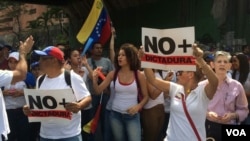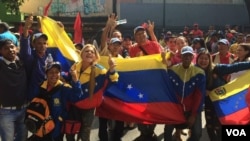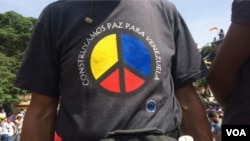With Venezuela’s capital girding for massive demonstrations Wednesday, President Nicolás Maduro is accusing the United States of trying to overthrow his leftist government.
In an address from the national palace in Caracas Tuesday evening, Maduro complained of “a State Department push” to “provoke an imperialist intervention” in the South American country, with pro- and anti-government demonstrations as a backdrop.
Venezuela’s center-right opposition is organizing “the mother of all marches” to protest Maduro’s administration, and the Venezuelan leader is rallying his supporters to turn out for a counter-march. Over the last several days, he has ordered military troops to fan out across the country and announced plans to vastly expand the country’s civilian militia – to half a million members from its current 100,000.
The U.S. State Department on Tuesday issued a statement warning that the “international community” would join in any response to the “criminal repression of peaceful democratic activity...”
The statement, put out by spokesman Mark C. Toner, urged nonviolent demonstrations. “We deplore the use of violence against unarmed protestors,” it said. Using the abbreviation for the ruling United Socialist Party, it particularly warned against using “colectivos – armed bands under the political control of PSUV party leaders – to repress protestors while the security forces … idly stand by.”
Security forces and members of the judiciary, the statement continued, have “legal and constitutional responsibilities to protect, not prevent, peaceful demonstrations.”
Maduro rejected the statement, saying the State Department in essence had announced a coup against Venezuela.
“Whoever wants to see the script written to generate violence, death … read the statement. There is the plan,” he said.
Weeks of protest
At least five people have been killed in over two weeks of protests, with security forces firing rubber bullets, tear gas and water cannons. The turbulence erupted after the Venezuelan Supreme Court’s March 30 announcement that it would strip the opposition-controlled National Assembly of its legislative powers. The court – stacked with appointees of Maduro and his predecessor, the late Hugo Chavez – reversed its position in the wake of domestic and international outcries about an attempted power grab.
Thousands of Maduro’s opponents are expected to turn out Wednesday, converging on central Caracas to pressure his administration to respect the assembly’s autonomy, schedule long-delayed elections, free political prisoners and restore other democratic norms.
Unidad Venezuela, a coalition of opposition parties, also is organizing marches in each of the country’s 24 states, according to the group’s Twitter account. Demonstrators also are expected at the Venezuelan embassy in Washington.
Diosdado Cabella, a Maduro backer and vice president of the ruling United Socialist Party, said he anticipated about 60,000 motorcyclists to join marchers in support of the government.
"We are going to mobilize, to fight, to continue fighting to prevent any intention of the right to subvert the constitutional order," added Cabella, a lawmaker in the National Assembly.
Conflicting messages
But the leftist government’s opponents also are appealing to military and civilian troops to back their cause.
“We know that behind those shields are Venezuelans who accompany us in this struggle for a change,” the National Assembly’s president, Julio Borges, said in a tweet Tuesday.
The National Socialist Party has ruled Venezuela for 17 years. Economic pressures have mounted in recent years, especially since the price of oil – Venezuela’s chief export – began falling in 2014. Venezuelans face chronic, severe shortages of food, medicine and other basics in what once was Latin America’s wealthiest country.
Wednesday’s mass protest falls on a significant date for Venezuelans: On April 19, 1810, Venezuelans began their quest for independence from Spain.
Concern over bloodshed
Maduro faces intensifying pressure, from internal political foes and from international bodies such as the Organization of American States, to back off from violence.
“We view with serious concern the militarization of Venezuelan society. We call for good sense,” Colombian President Juan Manuel Santos said in a tweet Tuesday, according to the AFP news service.
Colombia is among 11 Latin American countries – including Brazil, Argentina and Mexico – urging peaceful demonstrations. They called upon Venezuela’s government to respect the constitutional right to peaceful protest.
On Tuesday, the Venezuelan Penal Forum, an NGO, said security forces in the country have carried out 538 arrests since early April. It said that as of Monday, 241 people were being detained. It also reported multiple instances of torture and cruelty to detainees.
VOA Spanish Service intern Goldy Fogel contributed to this report from Washington






